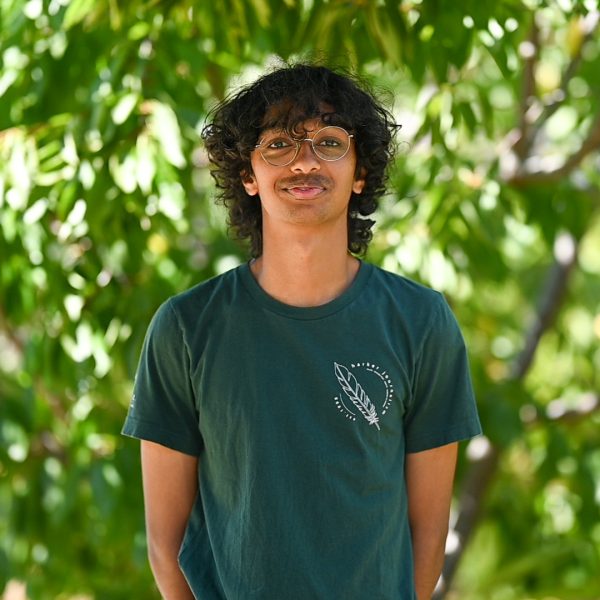
Fast fingers at a keyboard. A sharp ear for harmony. A calculated play in a card game. For Luke Zeng (’25), these moments — scattered across different spaces at Harker — define how he thinks, learns and expresses himself.
When Luke entered middle school, one of the first decisions he faced was choosing an elective. Although few options stood out at first, he eventually chose choir. That decision would go on to define much of his Harker experience. Upon entering his first rehearsal, Luke felt drawn to the community aspect of choir.
“I’ve met a lot of friends and other people through music, and I’m part of the community now, which makes you feel more connected,” Luke said. “It’s made me more confident too, because when you perform, you have to think about things in a different way. It’s given me more of a perspective — the performance mindset.”
Now, as one of Capriccio’s senior members, Luke takes on a leadership role. He’s not just responsible for knowing his part but also for keeping others on track during rehearsals. Fellow Capriccio member junior Ishan Mysore appreciates Luke’s willingness to help others improve their own skills.
“He’s always one to steer us back on the right track,” Ishan said. “He makes sure you know every note and every phrase, and he’s the main reason why we’ve even become close to performance level in the first place.”
Though choir is a group activity, Luke sees it as a space where individuality can shine. Every singer brings something slightly different to the group, and he believes that personal expression matters just as much as collaboration.
“I like to argue that choir isn’t actually about teamwork, because most of it is about you. What other people do is not really that important. It’s more about you expressing yourself, and everyone else is doing the same, expressing themselves. And then it just happens to work out. It’s not really like you have to be in a subservient situation,” he said.
Luke also sees choir as a way to reset, as shifting between music and academics gives him space to reflect and return to work with renewed clarity.
“When you think about music, you’re not thinking about other subjects, which means you kind of leave the room, then you come back in with a different perspective,” Luke said. “If you spend all your time on one subject, you’re just going to get accustomed to it. But if you leave and go to music, then come back, you’ll have a different perspective on it, which will give you a nuanced perspective.”
Outside of school, Luke uses strategy games to unwind. His go-to is Magic: The Gathering, a collectible card game where players summon creatures and cast spells to outwit opponents. While often played for fun, betting adds an extra layer of competition.
“When you play, when you put the cards down, when you do anything, probability is all it has,” Luke said. “It doesn’t have much to do with your reaction and skill like most modern video games. It’s more calculated. Everything is probability.”
That logic-driven mindset sets him apart and impresses his friends. Close friend Aaron Chen (’25) appreciates Luke’s commitment to his hobbies.
“When he saw that challenge, he found basically all the best strategies to the game, and was far ahead of everyone else,” Aaron said. “The time he invested into that demonstrated thinking out of the box. That dedication to do something was so cool.”
Luke also channels this same dedication into computer science, and he’s known for tackling challenges with patience and precision. Computer science department chair Eric Nelson witnessed Luke’s dedication firsthand.
“He has a phenomenal work ethic,” Dr. Nelson said. “His professional standards are ridiculously high. He really pays attention to the details to make sure that he meets requirements.”
As a key member of Harker’s computer science community, Luke consistently aims to present his best ideas, even if that means putting in long hours to get there. To him, the creative thinking he builds through music enhances his technical work since both require focus, originality and precision.
“Music forces you to think differently,” Luke said. “You think differently from when you’re doing a lot of other stuff, which allows you to form better connections in your other subjects. That’s why it’s important, because of the diversity of experiences: you need to be able to be creative.”


















![“[Building nerf blasters] became this outlet of creativity for me that hasn't been matched by anything else. The process [of] making a build complete to your desire is such a painstakingly difficult process, but I've had to learn from [the skills needed from] soldering to proper painting. There's so many different options for everything, if you think about it, it exists. The best part is [that] if it doesn't exist, you can build it yourself," Ishaan Parate said.](https://harkeraquila.com/wp-content/uploads/2022/08/DSC_8149-900x604.jpg)




![“When I came into high school, I was ready to be a follower. But DECA was a game changer for me. It helped me overcome my fear of public speaking, and it's played such a major role in who I've become today. To be able to successfully lead a chapter of 150 students, an officer team and be one of the upperclassmen I once really admired is something I'm [really] proud of,” Anvitha Tummala ('21) said.](https://harkeraquila.com/wp-content/uploads/2021/07/Screen-Shot-2021-07-25-at-9.50.05-AM-900x594.png)







![“I think getting up in the morning and having a sense of purpose [is exciting]. I think without a certain amount of drive, life is kind of obsolete and mundane, and I think having that every single day is what makes each day unique and kind of makes life exciting,” Neymika Jain (12) said.](https://harkeraquila.com/wp-content/uploads/2017/06/Screen-Shot-2017-06-03-at-4.54.16-PM.png)








![“My slogan is ‘slow feet, don’t eat, and I’m hungry.’ You need to run fast to get where you are–you aren't going to get those championships if you aren't fast,” Angel Cervantes (12) said. “I want to do well in school on my tests and in track and win championships for my team. I live by that, [and] I can do that anywhere: in the classroom or on the field.”](https://harkeraquila.com/wp-content/uploads/2018/06/DSC5146-900x601.jpg)
![“[Volleyball has] taught me how to fall correctly, and another thing it taught is that you don’t have to be the best at something to be good at it. If you just hit the ball in a smart way, then it still scores points and you’re good at it. You could be a background player and still make a much bigger impact on the team than you would think,” Anya Gert (’20) said.](https://harkeraquila.com/wp-content/uploads/2020/06/AnnaGert_JinTuan_HoHPhotoEdited-600x900.jpeg)

![“I'm not nearly there yet, but [my confidence has] definitely been getting better since I was pretty shy and timid coming into Harker my freshman year. I know that there's a lot of people that are really confident in what they do, and I really admire them. Everyone's so driven and that has really pushed me to kind of try to find my own place in high school and be more confident,” Alyssa Huang (’20) said.](https://harkeraquila.com/wp-content/uploads/2020/06/AlyssaHuang_EmilyChen_HoHPhoto-900x749.jpeg)




